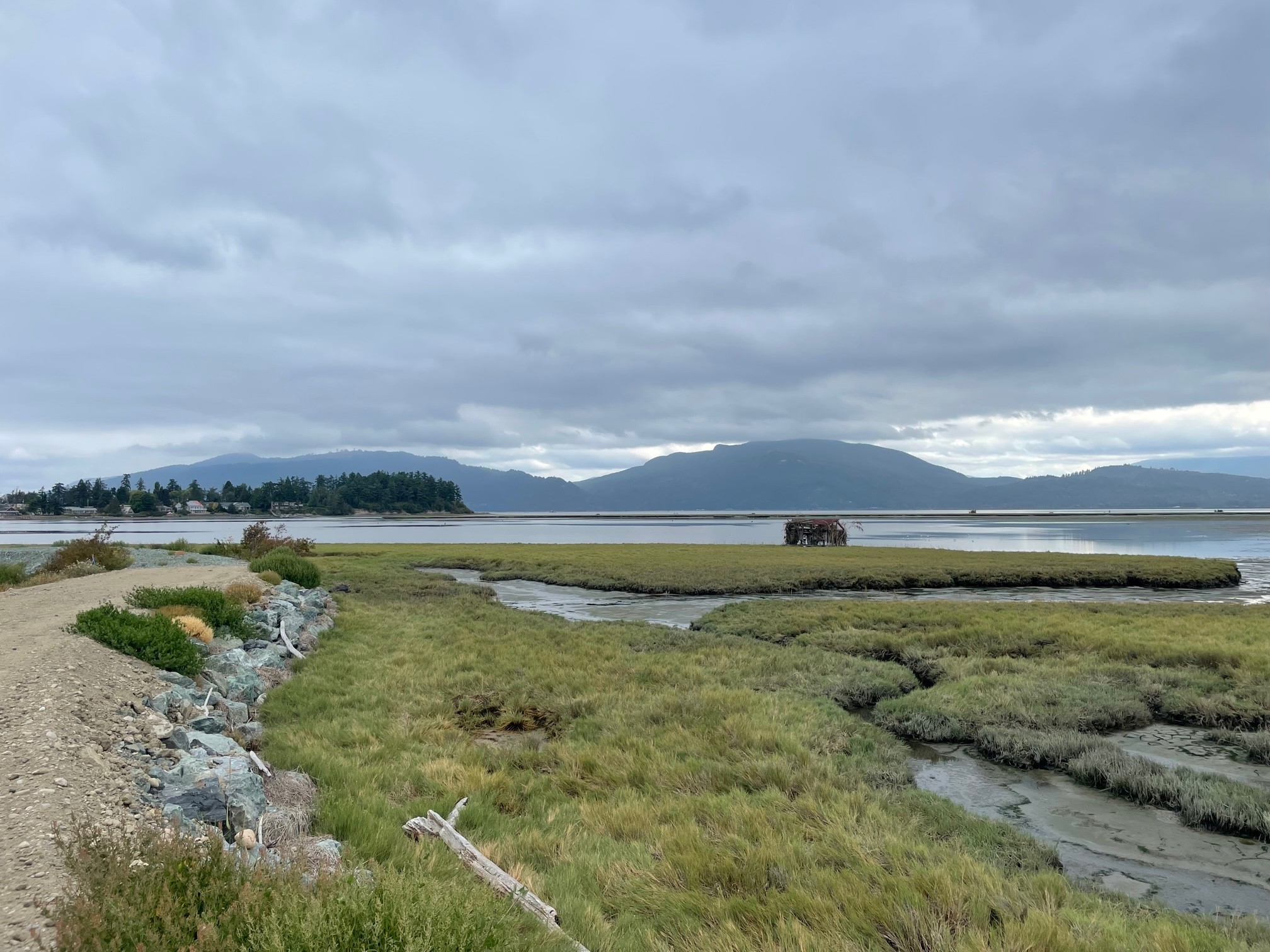
The Padilla Bay integrated resilience strategy will identify restoration and nature-based design alternatives for the area of land that lies between Samish Bay (pictured) and Padilla Bay.
The National Oceanic and Atmospheric Administration (NOAA) has awarded $122 million to coastal states and territories and National Estuarine Research Reserves using funding provided by the federal Bipartisan Infrastructure Law, Inflation Reduction Act and Coastal Zone Management Act.
Ecology helped develop various project proposals for NOAA’s consideration in collaboration with coastal communities, Tribes, and state agency partners. The federal funding supports coastal habitat restoration and land conservation projects including:
- planning
- engineering
- design
- implementation
We’re proud to announce that NOAA has provided $5.4 million to fund five Washington projects. They will improve the ability for coastal communities and Tribes to thrive in the present, adapt to hazard challenges, and transform as necessary to meet future threats and opportunities. The projects will restore critical habitat and build resiliency to climate change-related hazards such as saltwater intrusion, coastal erosion, and sea level rise.
Padilla Bay ecosystem stewardship
The Padilla Bay National Estuarine Research Reserve was awarded $1.8 million to continue critical research, monitoring, restoration, and stewardship activities. The Washington Legislature and U.S. Congress created the reserve in 1980 because of its extensive eelgrass meadow. Managed by Ecology, the reserve is part of the broader National Estuarine Research Reserve System. The national network of reserves is helping channel federal funding into local coastal restoration projects.
Padilla Bay is located in Puget Sound at the saltwater edge of the Skagit River delta in Skagit County. The Padilla Bay Reserve manages more than 235 acres of uplands and oversees research, monitoring, and stewardship of 11,700 acres of tidelands including 8,000 acres of eelgrass meadow. The Padilla Bay Reserve supports various marine education programs for a range of audiences and age groups. The reserve also hosts the Coastal Training Program which provides practical, science-based training to professionals involved in shoreline management. Due to its deep connections with the local community, the reserve is ideally positioned to spearhead the planning and execution of vital conservation and restoration efforts.
Owl Creek habitat restoration project, phase two
Trout Unlimited was awarded $1.6 million to restore more than a mile of Owl Creek in Clallam County. Trout Unlimited is working in partnership with Hoh Tribe on the project. Owl Creek is an important Hoh River tributary that has experienced habitat degradation and habitat loss that has detrimentally affected salmon and forage fish species. The project will restore large sections of the creek and adjacent floodplain by constructing almost 40 engineered log jams, installing 20 large pieces of woody debris, and restoring more than 20 acres of riverside habitat. Restoring Owl Creek will improve spawning and rearing habitat for Chinook and coho salmon, steelhead, and resident trout species. The restoration project will create local job opportunities and help make coastal communities more resilient to climate change.
Coastal resilience fellowship program
Our partners at Washington Sea Grant received $875,000 to develop, launch and operate a new Washington Coastal Resilience Fellowship Program focused on enhancing climate change resilience for coastal communities and Tribes. Sea Grant anticipates hiring five early career professionals each year to work in underserved coastal communities and with Tribes to support coastal resilience planning, projects, and capacity-building activities.
Coastal prairie restoration
Our Padilla Bay Reserve was also awarded $623,000 to restore 15 acres of old pastureland dominated by non-native species to a diverse, rare, and species-rich native coastal prairie habitat more resilient to climate change. The project will use a staged-scale adaptive management approach and integrate modern methods with traditional knowledge and practices developed by the Coast Salish Peoples. This project will be coordinated by the reserve in partnership with Ecostudies Institute, Samish Indian Nation, and Swinomish Indian Tribal Community with the goal of increasing biodiversity, habitat resilience, and Tribal access to culturally important species.
Padilla Bay integrated resilience strategy
As administrator of Washington's Coastal Zone Management Program, we received $500,000. Our Padilla Bay Reserve will use the funding in partnership with Skagit Land Trust to establish a long-term habitat and community climate resilience vision to address flooding, erosion, and saltwater intrusion in the Padilla Bay watershed. The project will help identify nature-based design alternatives to address coastal habitat and infrastructure resilience in this ecologically and culturally significant region. This includes restoring and protecting tidal marsh and tidal slough habitat areas while also improving resilience for local road and dike infrastructure.
A community work group will address the vulnerabilities of roads, dikes, agriculture, drainage, rural communities, and habitat to sea level rise along the eastern shore of Padilla Bay, Samish River delta, and southern shores of Samish Bay. Other project partners include Skagit County, Samish Indian Nation, Swinomish Indian Tribal Community, Dike, Drainage, and Irrigation Improvement District 5, and Skagit County Drainage and Irrigation Districts Consortium.
For more details about these projects, please contact Ecology’s Henry Bell or Raquel Crosier.

